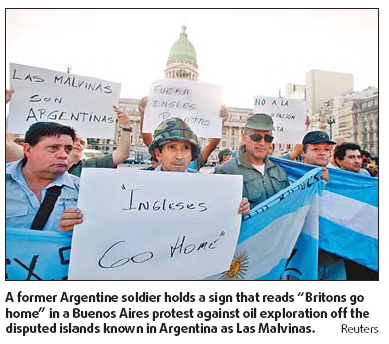Global General
Argentina seeks UN help in dispute with Britain
(China Daily)
Updated: 2010-02-26 08:50
 |
Large Medium Small |
Prospect of oil harvest renews tensions over scene of 1982 'Falklands War'
BUENOS AIRES, Argentina: Argentina's foreign minister asked the head of the United Nations on Wednesday to help resolve a dispute with Britain over a swath of the southern Atlantic Ocean where Britain has begun drilling for oil.

Following a meeting with UN Secretary-General Ban Ki-moon at UN headquarters, Foreign Minister Jorge Taiana told reporters Ban was not happy tensions have worsened because of Britain's decision to start drilling and was willing to continue his "good offices" mission.
A statement issued later by Ban's office said the secretary-general "took note of Argentina's concerns" in the meeting with Taiana. "The secretary-general expressed satisfaction at Argentina's commitment to resolving its dispute with the United Kingdom over the islands in a peaceful manner."
The UN General Assembly called for Argentina and Britain to negotiate sovereignty over the islands following a brief 1982 war for control, which Britain won.
Britain has ruled out any concessions involving the islands that its people have occupied since the early 1800s.
"As British ministers have made clear, the UK has no doubt about its sovereignty over the Falkland Islands, South Georgia and the Sandwich Islands," Britain's UN Ambassador Sir Mark Lyall Grant said in a statement.
"This position is underpinned by the principle of self-determination as set out in the UN Charter. We are also clear that the Falkland Islands government is entitled to develop a hydrocarbons industry within its waters, and we support this legitimate business in Falklands' territory."
Taiana called Britain's oil-drilling operation "an illegal act that goes against international law and against express UN resolutions asking that neither side take unilateral actions that could aggravate the situation."
The foreign minister reiterated Argentina's position that the islands are part of the South American country's territory and that the islands' residents, who strongly favor retaining ties to Britain, do not have the unilateral right to decide what they want the islands to be.
The issue heated up this week when Argentine President Cristina Fernandez protested the start of British oil drilling near the islands, calling it "robbery." She had already imposed restrictions on ships that pass through seas near the islands - but Britain told its ship captains to ignore them.
Argentina's call for negotiations won support this week at a summit of every country in the Western Hemisphere save the US and Canada. The leaders meeting in Mexico backed "the legitimate rights of the Argentine Republic," but stopped short of directly endorsing its claim to sovereignty. Their resolution also did not specifically mention oil drilling.
Brazilian President Inacio Lula da Silva criticized the United Nations for not pushing more forcefully to reopen the debate over the territory.
"What is the geographic, the political or economic explanation for England to be in Las Malvinas?" Silva asked, using Argentina's name for the islands. "Could it be because England is a permanent member of the UN's Security Council (where) they can do everything and the others nothing?"
US State Department spokesman P.J. Crowley said Tuesday that Washington is "neutral on the question of sovereignty" but supports "good-faith dialogue between those two countries."
But people in the islands say Argentina is engaging in its own form of colonialism.
Jan Cheek, a member of the islands' local legislative assembly, said Argentina's demand for sovereignty talks ignores the self-determination rights of islanders, most of whom want to be British.
AP






